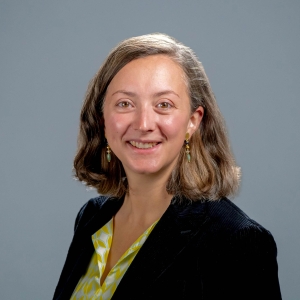Cynthia Gerlein-Safdi
640 Sutardja Dai Hall

Cynthia Gerlein-Safdi is an Assistant Professor of Civil and Environmental Engineering and a Faculty Scientist in the Climate and Ecosystem Sciences Division in UC Berkeley. Gerlein-Safdi’s research focuses on ecohydrology and it combines modeling, laboratory experiments, fieldwork, and satellite data to better understand the link between the water and carbon cycles in vegetation across spatial and temporal scales. She is interested in the effects of dew, fog, and rain interception on canopy water and carbon fluxes, the effects of soil moisture variation on plant functioning, and the dynamics of wetland extent on methane emissions. Her research spans a broad range of ecosystems and methods to provide new insight into natural environments and the mechanisms driving them.
Certificate in Science, Technology, and Environmental Policy, Princeton University, 2019
Ph.D., Civil and Environmental Engineering, Princeton University, 2017
M.Eng, Geophysics, Engineering School of Geophysics of Strasbourg (EOST), France, 2012
M.Sc., Environmental Engineering, University of Strasbourg, France, 2011
B.Sc., Earth and Planetary Sciences, University of Strasbourg, France, 2009
Gerlein-Safdi’s research focuses on combining analytic methods with remote sensing, cutting-edge computational techniques, and field and laboratory experiments to describe previously unknown mechanisms between soil, canopy, and atmospheric water dynamics. Her lab group’s research goals are to better understand the link between water and carbon in the soil-plant-atmosphere continuum in the context of a changing climate and determine how ecohydrology may apply to practical problems such as the hydrological impacts of land-use change. Here are a few of the research projects Safdi is currently working on below:
- Plant physiology - Gerlein-Safdi’s lab group develops process-based models of plant function to understand their water, carbon, and energy balance. They are especially interested in the intersection between water and carbon and how these two cycles are affected by climate change. Her research team is currently focusing on the solar-induced chlorophyll fluorescence (SIF) response of grasslands to variations in soil moisture. They have started monitoring SIF at the Point Reyes soil warming experiment using a new SIF Imager by Headwall. The instrument allows them to measure SIF instantaneously within a whole ecosystem or in multiple treatment plots at once.
- Dew, fog, and rain interception - Gerlein-Safdi’s lab group is interested in the effects of dew, fog, and rain interception on soil moisture and plant functioning: how does the proportion of plant water coming from dew, fog, or rain vary throughout the season in different ecosystems? How much water can leaves retain on their surface? How does leaf wetness affect transpiration and photosynthesis? They are currently studying these issues at the Point Reyes Field Station in California.
- Remote sensing - Gerlein-Safdi’s lab team has expertise in microwave remote sensing (scatterometer and GNSS-R) and solar-induced fluorescence satellite data. They are interested in using these tools to understand large-scale water-carbon relations across ecosystem types. Recently, Gerlein-Safdi developed an algorithm to analyze and process CYGNSS data to map tropical wetlands. These maps have helped improve methane emissions models and predictions.
Spotlights
No mentions in Spotlights


